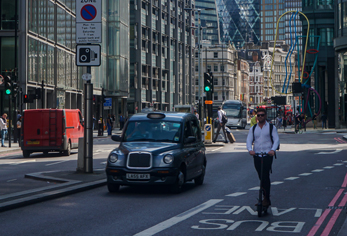Transport for London (TfL) and London’s boroughs have launched a competition to select up to three operators for a twelve-month trial of rental electric scooters.
TfL said the trial, run in conjunction with London Councils, aims to ‘promote safety standards and develop a better understanding of the impact of this emerging mode of transport on London's roads’.

E-scooters are currently illegal on London's roads
The trial, which is due to start in spring 2021 and which TfL said ‘is likely to be the largest in the UK’, is open to all e-scooter operators.
London has been relatively slow to take up the option of running trials, with many authorities having launched them over the summer.
Michael Hurwitz, TfL's director of transport innovation, said: ’We're determined to make sure that London recovers from coronavirus as safely and sustainably as possible and are supportive of innovative solutions that could help.
‘Safety will be our number one priority during this e-scooter rental trial, which will be critical to providing us the data and insights we need to determine whether e-scooters are a viable part of a greener and healthier future for London. We'll continue to take the interests of all Londoners into account as we work towards starting the trial next year.’
TfL said the trial will provide valuable data to understand the impact of e-scooters on the way people travel around the capital.
While all London boroughs can take part, only around a third have expressed their intention to join the trial initially, ‘with more considering joining at a later stage’.
Operators bidding to take part will be assessed on their ability to meet ‘strict safety requirements and high operating standards’, TfL said, and will also be required to provide critical data for TfL and the boroughs to understand the impact of e-scooters on London's transport goals.
TfL said the total number of e-scooters in the trial has not yet been determined, but it expects it to start cautiously with between 60 to 150 e-scooters per participating borough, and e-scooters able to move freely across the trial area.
‘Operators who demonstrate strong performance and compliance will be able to increase the number of e-scooters in their fleet over the course of the trial, whilst those who do not may have to reduce their fleet size.’
Boroughs will control parking locations and will be able to designate certain areas as 'no-go areas' – where e-scooters will automatically come to a safe stop – or as 'go-slow areas', where the e-scooter will be automatically limited to 8mph.
E-scooters will be banned from riding on pavements - but will be able to use the same space as bicycles.
TfL said that it, London Councils and the boroughs ‘will also continue to work closely with stakeholders, including TfL's Independent Disability Advisory Group, to ensure that the trial meets the needs of everybody living in, working in and visiting the trial areas’.
Fred Jones, UK general manager of scooter firm TIER, said: ‘TIER is applying to participate in the London trial, which we believe can bring huge benefits to the city.
‘With our COVID-safe helmets on every trip and an energy network that will generate millions for local stores and cafes, climate-neutral TIER is well-placed to be London’s safe, sustainable partner in the capital's economic recovery. We very much hope to work with the city on this scheme.’
Register now for full access
Register just once to get unrestricted, real-time coverage of the issues and challenges facing UK transport and highways engineers.
Full website content includes the latest news, exclusive commentary from leading industry figures and detailed topical analysis of the highways, transportation, environment and place-shaping sectors.
Use the link below to register your details for full, free access.
Already a registered? Login